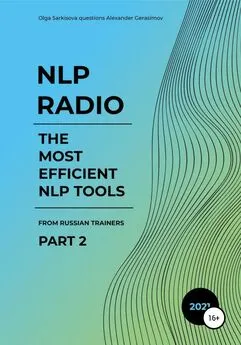Александр Герасимов - NLP Radio. The most efficient NLP tools. Part 2
- Название:NLP Radio. The most efficient NLP tools. Part 2
- Автор:
- Жанр:
- Издательство:неизвестно
- Год:2021
- ISBN:нет данных
- Рейтинг:
- Избранное:Добавить в избранное
-
Отзывы:
-
Ваша оценка:
Александр Герасимов - NLP Radio. The most efficient NLP tools. Part 2 краткое содержание
NLP Radio. The most efficient NLP tools. Part 2 - читать онлайн бесплатно ознакомительный отрывок
Интервал:
Закладка:
Александр Герасимов
NLP Radio. The most efficient NLP tools. Part 2
CHAPTER 1
METAPROGRAMS.
MOTIVATION TOWARDS & FROM
Hello, everyone. And again this is NLP radio on stream. Today
in our studio we are having our usual guest – a famous NLP trainer
in Russia, a professional negotiator, Alexander Gerasimov. Hello,
Alexander.
Hello, Olga.
Dear listeners, we have learned a lot by American materials
of Richard Bandler and John Grinder. We have learned and read
lots of books, and now we have prepared something to introduce
you, some products you are going to be interested in. Now
we will treat you with something. And the topic discussed
today is metaprograms. The first question: what actually
are “metaprograms”?
Metaprograms are – so to speak – person’s habitual ways of thinking, of making a choice, of making a decision. It is what we have had for ages and what is integrated into us rather seriously.
For example. All of us have a certain number of metaprograms. And we can choose how many programs we should have independently.
For example, we have a metaprogram of motivation. It is what we will be talking about today. And a person habitually picks either motivation of striving for something, or motivation of avoiding something. In the form of a metaphor, we can imagine a selector between diametrically-opposed positions – “either… or.” For example, a person having a metaprogram of avoiding will be afraid of literally everything. And there is a person having a metaprogram of striving.
As a diametrically-opposed example, for better explanation. A person, who is striving for something… in spite of everything… ‘I see my target…’ ‘I believe in myself…’ ‘I ignore obstacles…’. Normally, ordinary people are somewhere between these positions, inclined to a certain metaprogram. And there can be a large amount of such
habits, metaprograms. I can add a couple of such dichotomies.
I’ve heard about the book describing 51 metaprograms in NLP…
by Michael Hall… but I would say that every tool… including for negotiations, and for self-improvement… the transformation of quantity into quality occurs but not always… sometimes, the quantity is so extensive and large that it is not easy to fetch. For example, there is a classification of people comprising 8 personality types, and just imagine a classification comprising 1,000 personality types.
When you learn this classification, you won’t want to learn any other classifications. …And there is an optimal amount of metaprograms.
For example, about 10 or 15. I believe that there are 51 metaprograms, but I don’t believe that it would be a rather rational tool.
Do we count them in pairs? Do we count number of pairs
or all together?
Pairs.
In the beginning I wanted to ask this question at the end of our
conversation, but logically it is going to be put right here. How
are they actually formed and under which circumstances are they
formed? And what actually influences their formation?
All of us are products of our childhood. Those are formed including based on our experience, our family education, our personal experience… interaction with other people… and on what kind of books a person read in their childhood… on in what kind of family a person was brought up… Of course, metaprograms are partially influenced by a physiological component… I mean, there are people – so to speak
– actually slow… naturally… for example, they have such nervous system… slow reaction time… I will name three main metaprogram forming factors. Number One – is physiology, human physiology.
It is an individual characteristic. We are very different. We have different characters. It was the first factor. Number Two – is conditions in which children are raised in their family. It refers to parents, scenarios, nutrition, and parenting style… Number Three – is social interaction.
For example, it not necessarily refers to some people, neighbors, or friends… or schoolmates…. It can refer to books, which we choose
to read consciously… So we have three substantial levels. And a combination of those… Well, an earlier level affects a later level, and forms the personality of a person. It doesn’t mean that a person will be… for example, if it is an “avoiding,” or, for example, a “reflexive”
person, you won’t be able to help it… It is possible to adjust, to correct…
and then it’s the matter of resources you are willing to invest. And it is possible to reformate them, providing that those were formatted.
Okay. I remember: in one of your performances, in one of your
interviews you said that imprints, imprinted experience, play
a role. Do they?
Yes. I just haven’t named this word, and these childhood experiences, obtained in childhood when our mental health is the most vulnerable, can be called imprints. …Depending on imprints, including parenting style… For example, a child constantly being hurried by his or her parents… or, on the contrary, a baby to whom everyone around, parents, credible people say, ‘Don’t hurry.’ ‘Weigh everything!’ ‘Check whether you’ve taken it,’ ‘Recheck!’ And an initially high-energy child gradually begins to move slower. Sometimes that child is told to stop doing something, sometimes – scolded, sometimes – praised. And eventually it gets formed. I mean, it has influence. Maybe it is not a key element, and maybe it is impossible to distinguish a key element, but it surely is a component having a certain share of influence.
Right. Okay. Let’s talk detailedly about each aspect of motivation.
Motivation towards and motivation from. Which are pluses and
minuses of each in our life?
This is not to say that FROM motivation is bad, and TOWARDS
motivation is good. It is the matter of applicability. There is a range of peculiarities, or – so to speak – personality traits. A person having rather FROM motivation is more cautious, attentive… such person avoids… and doesn’t want something to be… something to happen…
Normally, those people are more observant. And more sensitive. Unlike TOWARDS motivation, where a person is rather result-oriented, and, like they say, an arrow heading towards a target is not distracted by the landscape. …So, a person having TOWARDS motivation may
be insensitive to other people and to their reaction. This is not always the case. There’s a certain correlation. For example… I would… apply it… I mean positive or negative… if I meet a person rather having FROM motivation… I would try to match that person’s motivation, and would talk to a greater extent about problems we should avoid…
We would figure out them together. Or, for example, a goal-oriented person. It is easier to involve such person into something, it is easier to offer some prospects, goals, plans to such person, and he or she will immediately start doing something… to achieve a certain goal.
Pure FROM motivation or TOWARDS motivation… not that it is difficult to encounter… such people are just rarer. More frequently, it is about balance, about proportions. For example, a person may have 70%
of FROM motivation and 30% of TOWARDS motivation. It’s rather the question of how it shows itself, how to estimate it in natural environment, because… if we were carrying out some tests, and if a person knew about such tests, he or she could intentionally influence…
This is exactly what I wanted to specify. It is definitely in the
context. So probably to illustrate somehow? How do we specify it?
First of all, it is the context of interaction with other people. For example, in business it may be personnel recruiting. And a certain job vacation…
a certain occupation… very often TOWARDS motivation or FROM
motivation has an effect… For example, a doctor. … A doctor – is it TOWARDS motivation or FROM motivation?
If it is a dentist, as a doctor. Earlier it was FROM motivation. A patient should not have toothache. In recent years, maybe in recent decades, medicine – dentistry – becomes more aesthetical, and it is rather TOWARDS. You might notice that… earlier we associated visiting a dentist with suffering… nowadays, marketing experts promote dentistry as – it is non-painful – it’s like we speaking the language of a FROM-motivation person, and we say, ‘It is non-painful’ …and a beautiful smile… it comprises two motivations – of those avoiding pain, and of those willing to look nice – at once.
And we can define a person’s motivation by their wording.
Or, for example, risk management. …Risk assessment at a company.
You can hardly imagine a risk manager, who will be striving for something… They will rather be modeling problems and resolve those in their mind. A company’s Chief Security Officer. …It is also rather FROM motivation – ‘Nothing should happen’ – than TOWARDS
motivation – ‘Let us hire more people.’ And occupation in personnel recruiting is probably the main context of metaprograms application.
And, basically, in any communication, it may be the context of attitude, the context of sales, the context of consulting and therapy, and the context of self-development – to understand yourself – you also should be able to distinguish metaprograms. Metaprograms
– in general, and FROM motivation – in particular.
Yes. It is a peculiarity that should be taken into consideration when distinguishing metaprograms. If we inform a person in advance about an upcoming testing, most likely he or she will get prepared to it psychologically. So, figuring out – not only FROM or TOWARDS
metaprograms – it should be as close as possible to the context, and the most naturally… In the ideal case, it is just observing a person in natural environment… Like some companies do… they have installed CCTV cameras in their waiting room, and they observe a person before that person comes for testing… it also has an effect…
Let’s move on to basic emotions of people with these or those
characteristics. What are basic emotions? I can guess that maybe
with motivation “to“ people have got anger or maybe interest.
Am I right or some other emotions?
Yes, yes.
And with ‘‘motivation“ from – not only fear, but I believe also
boredom. Am I right?
If we take boredom as an emotion, it consists of two emotions: it is some kind of a cocktail – the emotion of disgust, and the emotion of sadness …if we combine these two chemical elements we will get a third one – named ‘boredom.’ …And disgust is exactly FROM
motivation, avoiding. Of course, there is fear – when disgust gets to the active phase. …Well, boredom – it is exactly when there is something
Читать дальшеИнтервал:
Закладка:










